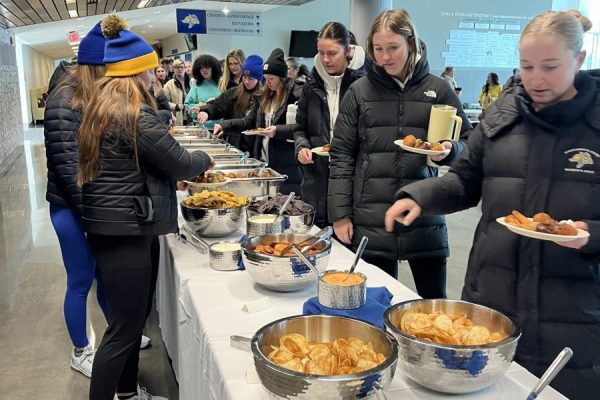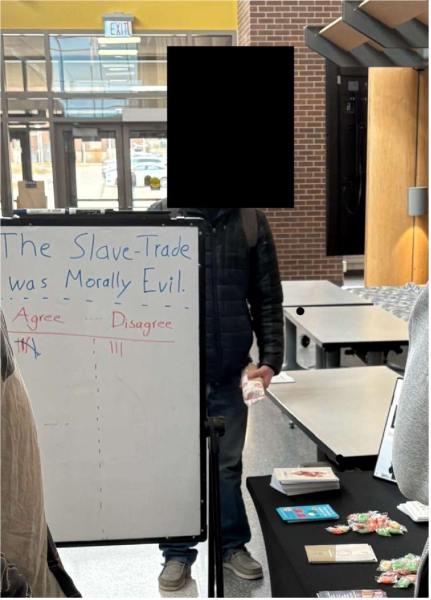Former struggling student finds success at graduate level
February 23, 2010
Kate Wegehaupt
It’s one of those days. You know the kind.
A day of struggling through classes on little sleep, being overloaded with activities and attempting to study for fast-approaching deadlines, not really sure if they matter.
Josh Warne had one of those years. A couple, actually. Currently a graduate student in business economics, Warne’s first years as an undergraduate left him wanting more.
After graduating from Lake Preston in 2000, Warne attended Northern State University in Aberdeen, followed by Cornell College in Mount Vernon, Iowa. But a lack of purpose moved him to reevaluate college life.
“It was actually good for me to take a step back and then say ‘I just need to focus on finding and living life.’ I was unhappy,” said Warne.
Warne spent the next five years finding that purpose, during which he moved to Phoenix, Ariz., married, and became a father. After being certified as a Harley Davidson technician, then working at AmeriServe International, an organization that helps persons with special needs, Warne found what he had been looking for.
“I was working at AmeriServe International, training people to work with the developmentally disabled,” said Warne, “At the end of the day, when I helped other people take a step forward, I felt good. Each one of those days, I stepped forward as a person. At that point, I realized that that was my driver in life.”
Warne decided to finish his degree, returning to South Dakota in 2008 after taking classes at Glendale Community College in Arizona.
“When I came back to school and I had a purpose, it was easier,” said Warne. “Careers change, not too often your purpose. What is it that makes you tick?”
Warne has worked hard to achieve his goals. Since June 2007 he has been a full-time student, sometimes while working up to 50 hours per week. Warne graduated last December with a business economics degree, completed in just two years.
Warne’s adviser, Carol Cumber, professor of economics, assisted Warne in organizing his non-traditional college experience.
“He was the kind of guy I wanted to work with,” said Cumber, “Not a word of ‘Why me.’ It’s like ‘Here’s where I’m at and here’s what I’m going to do to get it.”
In his first semester as a graduate student, Cumber invited Warne to participate in a ground-breaking economics project, studying the many business aspects of Daktronics. The research is the first of its kind, acting as a “case study” for students’ learning.
Researchers from across the country were impressed with Warne and his graduate work.
“Well respected researchers were taking him aside and talking to him about which Ph.D. program he’s going to apply for. They were so impressed with the quality of his work. He’s been embracing it and not being intimidated about what we asked him to do,” said Cumber.
One of those researchers, Joseph Kavanaugh of Texas’ Sam Houston State University, thought highly of Warne’s work ethic and drive.
“On short notice he undertook [a] very challenging research assignment over the December holiday period and delivered extraordinary results,” said Kavanaugh. “He is my hero, and the hero of the team. His research gave the team a great leg up in understanding the scope of our project.
“It is never easy to define the competitive environment of any business, much less one like Daktronics that operates in multiple markets,” said Kavanaugh. “Josh nailed it.”
With his drive to help others and a dedication to learning, Warne has found what it means to be successful.
“If you don’t feel good about what you do, you don’t really feel good about your paycheck. Why don’t we talk about that more? Over the first couple of years of college, if that was your focus, how would that impact you?”
How to find opportunities: Tips from Josh Warne
1. Get to know your professors “If I can get 25 minutes with a professor, I’ll take what I can get. Those conversations: ‘Where are we going with life? What can I take from you beyond the classroom?” The classroom molds me to have skills, those conversations [help me] find who I am as an individual and see where I am in the world.”
2. Meet others“Be involved, whether with the Econ. Club, intramural sports, talking to a professor outside of [the] classroom. Be a part of those social groups because those are going to lead you to opportunities you want to be a part of.”
3. Manage Time“Something I should have learned a lot earlier in life. Planning on paper, prioritizing on deadlines; when you get it on paper and out of your head, then you can do these things.”
4. Intern“If you’re a good intern, you get some good benefits. An internship is a gateway into a full time opportunity. I can show that I go beyond SDSU. You really take things away from those experiences.”





















